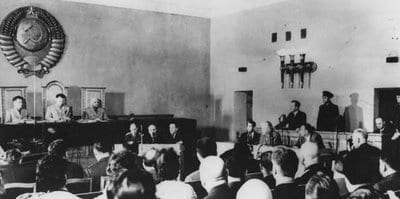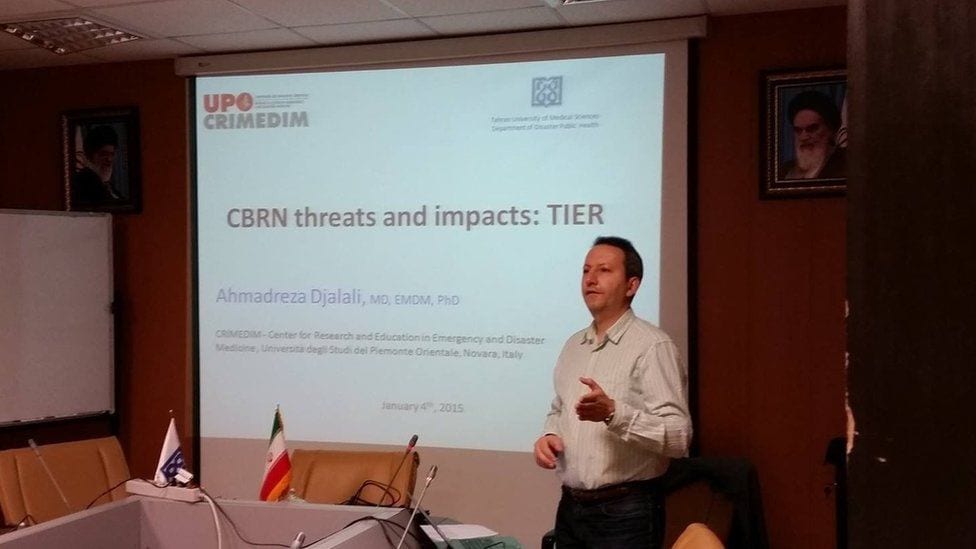The more we hear about the awful and abhorrent executions taking place in Iran the clearer it becomes how similar their so-called trials are to the Stalinist trials. In the recent case of Ruhollah Zam, who was convicted of “corruption on earth” for running a news website, we are reminded of this similarity.

Anything opposing the regime is defined as “corruption on earth”. Zam’s AMAD Telegram channel was one of the most popular Iranian social news network, publishing sensitive and classified images and documents, exposing Iran’s Intelligence services and politicians, news and material that the regime works hard to keep secret from the public. AMAD news was a highly successful news channel with millions of followers both inside and outside of Iran. In October 2019, Ruhollah Zam was captured by the Islamic Revolutionary Guard Corps in Iraq. Following the abduction, Ruhollah Zam was forced to confess to his charges and all was displayed on state-run TV channels. His court trial has been described as “unfair and relied on forced confessions” according to several human rights organizations including Amnesty International. He was forced to choose legal representation from a list of 20 lawyers approved by the regime. Seventeen charges were laid against him mostly focusing on espionage, conspiracy and crimes against national security. He was given the death sentence on June 30, 2020, Zam and his family appealed, but the appeal was overturned, he was executed by hanging on December 12th 2020.
These fake trials have the exact same function as Stalin’s Great Purge, getting rid of dissidents and oppositionists whether they be inside or outside the political party. Most defendants were charged with conspiring with Western powers to dismember the Soviet Union at that time. These show trials were made public and the judicial authorities had already decided on the guilt of the defendants before the trial started. The aim of making the trials public is to present the public with a warning to other dissidents and not to mention its powerful propagandistic effect.

The confessions were made under intensive torture and intimidation and the evidence presented at the trials were fabricated by the secret police (NKVD forerunner of the KGB). The Moscow trials took place between 1936 and 1938, millions fell victim to these cruel and despotic acts, but the effect of these undemocratic and unlawful trials have affected so many more lives through its mark on history.
Ruhollah Zam is not the first or last victim of the Iranian regime’s despotic and fear instigating rule. Human rights lawyer, Nasrin Sotoudeh, is still serving a 33-year long prison sentence. She has defended and represented numerous human rights activists, women rights activists as well as working to abolish the death penalty.

Just recently she was released for a short period from jail as she has tested positive for COVID-19. In the beginning of December 2020 it was decided that she would return to prison despite medical doctors’ advice to stay isolated because she was still contagious. While returning to jail, she took her time to express her concern and support to Ahmadreza Djalali, who also is facing the death penalty.

Swedish-Iranian academic Dr Ahmadreza Djalali is facing an imminent execution, he was arrested in 2016, convicted of espionage based on forced confessions and fabricated material. In October 2017, he was sentenced to death for “corruption on earth”. Dr Ahmadreza Djalali is an expert in the field of disaster medicine and his work has been dedicated to improving hospitals’ emergency responses to situations much like the situation the world is faced with today with the corona pandemic. Instead, he is now on death row in Iran. According to reports, Ahmadreza Djalali has refused to spy on behalf of the Iranian regime and that is why he was arrested in the first place.
Even though we would like to think that many things have changed since the 1930’ies, much is still the same, in particular in authoritarian and undemocratic countries like Iran, where the society is controlled by instilling fear in people. Some people refuse to stand by and watch while their societies and fellow human beings are continuously being oppressed, these individuals are specifically sought after and targeted by the regime, but their immense courage and fearless hearts shines through and inspire people to fight for freedom and change.
Author: Susanne Jameson
 Shabtabnews In this dark night, I have lost my way – Arise from a corner, oh you the star of guidance.
Shabtabnews In this dark night, I have lost my way – Arise from a corner, oh you the star of guidance.


